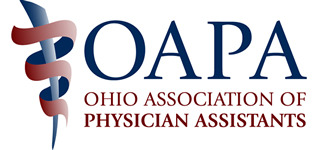Complete Story
10/06/2023
PA Week Spotlight: Christopher Heinrich, PA-C, M. Ed.
Happy PA Week, October 6-12, 2023!
OAPA is celebrating the growth of our PA community as it gets wider and more diverse every year. We cherish the value that PAs bring to the table and recognize the unique contributions each PA makes to health care landscape across Ohio.
Today we feature an interview with Christopher Heinrich, PA-C, M. Ed., a practicing Physician Assistant at the Cleveland Clinic.
1. What does PA week mean to you?
PA week is a week where we can take a step back and take pride in what we do and how we do it. We too can share what we do more outwardly to our communities, who perhaps may not have interacted with a PA before.
2. What is your favorite part of being a PA?
There are many, but perhaps my favorite is sitting bedside with a patient and their family or caregivers and feeling like we are working together to make the worst day of their life just a bit better. Involving patients in their own healthcare and giving them the feeling of autonomy in how they work through an illness is perhaps what gives me the most satisfying feeling of being a PA.
3. Do you currently take students or train other PAs?
I am a proud preceptor to PA students throughout the year, which is truly only possible with my colleagues who work opposite week of me so we can take students. We as a profession have a crisis on our hands. With growing programs and needs, we lack the preceptors needed to train the next wave and generation. Taking PA students helps me stay sharp clinically and always helps me consider other pathologies, it helps me to avoid becoming too reliant on heuristics and dogma of medicine. I am too involved in the transition of practice of new PA and NPs. As students become certified and make the jump from book to bedside, it can be daunting. I tell students nearing the end of their second year that they will read as much if not more than they do for boards, but the difference is they are now taking on new responsibilities. Helping new graduates adjust is a great honor.
4. What was your journey like to your current position?
During my second year at the University of Pittsburgh, I was on my Internal Medicine rotation at UPMC Mercy. I remember rounding with Dr. Philbin and his residents and seeing the care he provided, as well as the plethora of different pathologies they got to see day-to-day. Prior to that I was not sure where I wanted to work, but that rotation changed my perspective and gave me a sense of direction. It has been nearly 8 years since I graduated and though there are bad days as all of us experience, I truly do not see myself being anywhere else.
5. Why do you love your current work in Hospital Medicine?
I love Hospital Medicine because it allows me to see acutely ill patients with a variety of presentations, many times not fully worked up. I enjoy keeping a wide differential for particular problems and complaints. Many times, common things are common, and it is a horse in a zebra costume, but now and again you get to come across rare pathologies and diagnoses. Further, reaching an end diagnosis and helping specialists and subspecialists allows me to learn even more about particular advances in care and disease.
6. How does practicing in Hospital Medicine improve patient care?
We are sometimes the first medical provider in any capacity a patient has seen and have an opportunity to treat and teach. We can provide a roadmap for the patient to appropriate specialties in follow-up and keep them ideally out of the hospital. I feel in hospital medicine too we do a good job giving autonomy back to the patient. We provide the recommendations, but it is the patient at the center of care. When hospitalized independence feels lost: a patient is on scheduled medications, scheduled vital signs, in a gown, sometimes not allowed to ambulate freely, connected to drips and electronics and feeling tethered to the bed,etc. When we can give them ownership of their health back, it hopefully empowers them in a way to live a healthy independent life out of the hospital.
7. How has your role changed throughout your assignment?
Over the years I have had the opportunity to network and learn more system-based practice. I have completed my Masters in Education of Health Profession Education, which has provided me with a foundation to better teach students who cross my path. I have felt more comfortable saying yes to some committee work, and “no” to others, in order to strike a good work life balance. I have been more involved as a reviewer for JAAPA and JPAE, as well as working with my physician colleagues as the only APP on our Hospital Medicine Conference committee.
8. What do you see changing in the PA profession within the next 5 to 10 years?
As programs continue to be created, and more younger people engage with PAs, I see more certified PAs in the field. I do very much worry about the training offered with lack of preceptors and clinical sites being outpaced by the drive to enroll students to new programs and growing programs. I do see more online learning and remote learning taking place, which perhaps is inevitable. That said, I feel PAs will continue to fill roles and gaps in our healthcare system in this state and country. More PAs in outpatient roles can alleviate the strain on physician burnout and create more accessible care for patients.

